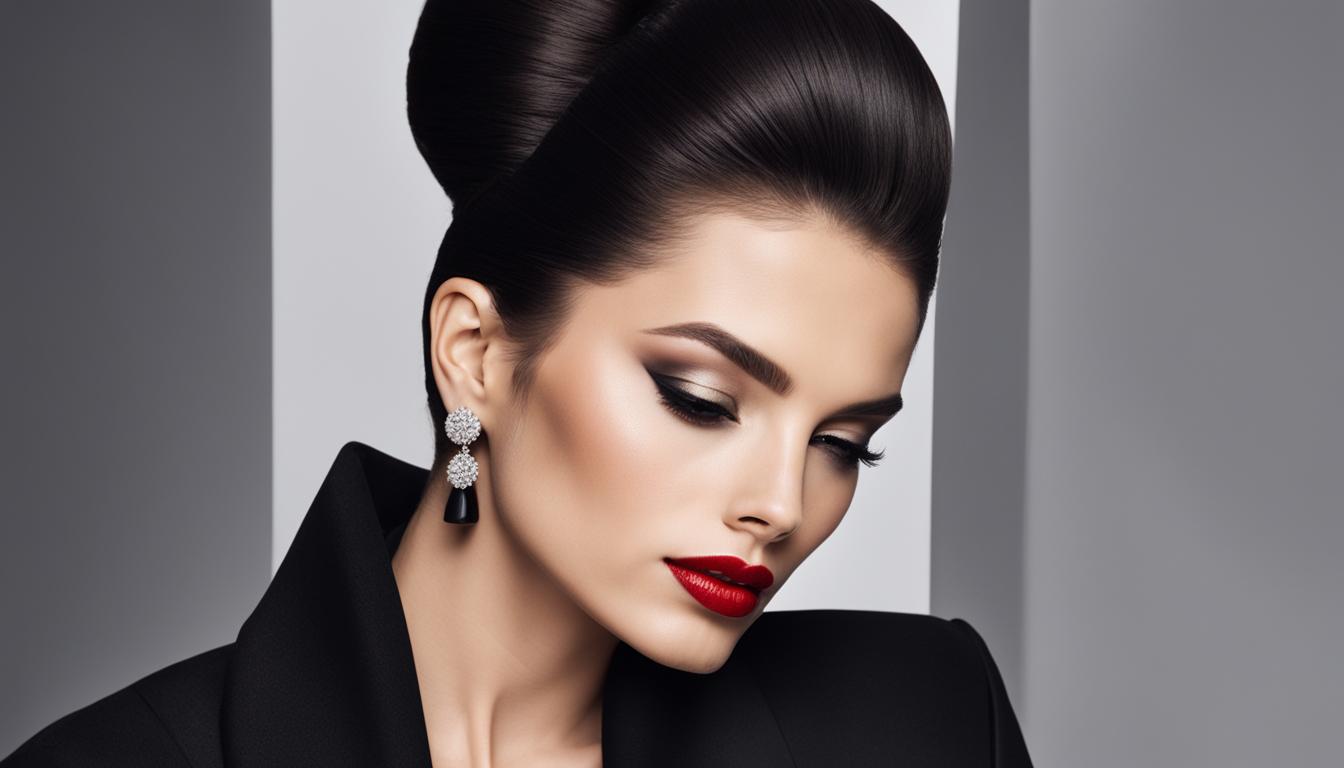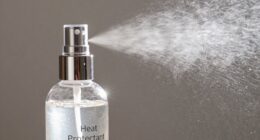Scalp care is essential for strong, beautiful hair. You need to start by cleansing your scalp regularly with sulfate-free shampoos to remove excess oil and dirt. Exfoliate weekly to clear dead skin cells and promote circulation. Incorporate nourishing treatments and hydrating serums to maintain moisture balance. Pay attention to your diet—rich in vitamins and omega-3s—to support scalp health. Avoid harsh chemicals and protect your scalp from UV damage. By creating a healthy foundation, you'll boost hair growth and strength. Stick around, and you'll discover more tips for enhancing your scalp care routine for vibrant locks.
Key Takeaways
- Maintain a regular cleansing routine with sulfate-free shampoos to remove excess oil and buildup for a healthier scalp.
- Exfoliate the scalp weekly to eliminate dead skin cells and promote blood circulation, enhancing hair growth.
- Incorporate moisturizing treatments and hydrating serums to ensure the scalp stays nourished and hydrated.
- Address common scalp issues like dandruff and folliculitis with targeted treatments and essential scalp care products.
- Adopt a balanced diet rich in vitamins and omega-3s, and manage stress to support optimal scalp health.
Importance of Scalp Health

Your scalp health is fundamental for vibrant, strong hair growth. A healthy scalp provides the ideal environment for your hair follicles to thrive and produce robust strands. When your scalp isn't healthy, you might face issues like dandruff, irritation, thinning hair, or even hair loss, all of which can greatly affect your hair's appearance and vitality. Incorporating specific herbal teas into your routine may also support your overall well-being, as certain varieties can enhance relaxation and reduce stress, which is beneficial for scalp health and hair growth teas for mental well-being.
Regular scalp care is important to prevent the buildup of dirt, oils, and dead skin cells that can clog your hair follicles. This buildup inhibits new hair growth and can lead to persistent scalp conditions like seborrheic dermatitis or psoriasis, which disrupt the balance necessary for healthy hair production.
Moreover, your scalp's natural sebum production acts as a conditioner, offering hydration and shine to your hair. By maintaining a balanced and healthy scalp environment, you not only enhance your hair's look but also support its strength and longevity.
Prioritizing your scalp health means investing in the foundation of your hair care routine, ensuring that your locks have the best chance to flourish. Remember, a little attention to your scalp goes a long way in achieving beautiful, strong hair.
Key Practices for Scalp Care

To keep your scalp healthy, establish a regular cleansing routine with sulfate-free shampoo to remove dirt and excess oil.
Incorporating products with glycolic acid benefits can further enhance your scalp health by promoting exfoliation and reducing irritation.
Don't forget to gently exfoliate once a week to clear away dead skin cells and product residue.
Regular Cleansing Routine
Establishing a regular cleansing routine is essential for maintaining a healthy scalp and promoting hair growth. To achieve ideal scalp health, you should wash your hair every other day if you have a normal scalp. However, if your scalp tends to be oily, daily washing might be necessary to control excess oil and product buildup.
Incorporate sulfate-free shampoos into your routine to remove dirt and prevent buildup, which can hinder hair growth. Additionally, using clarifying shampoos once a month will help eliminate stubborn residue that regular shampoos can't tackle.
Here's a simple guide to help you maintain a cleansing routine:
| Scalp Type | Recommended Washing Frequency | Additional Tips |
|---|---|---|
| Normal | Every other day | Use sulfate-free shampoo |
| Oily | Daily | Consider clarifying shampoo monthly |
| Dry | 2-3 times a week | Moisturize after cleansing |
Gentle Exfoliation Techniques
Gentle exfoliation is an important step in achieving a healthy scalp, as it removes dead skin cells and product buildup that can hinder hair growth. Incorporating gentle exfoliation into your routine can create a clearer environment for your hair to thrive.
Aim to use a scalp scrub or an exfoliating brush once a week to effectively enhance scalp clarity without causing irritation or damage to the hair follicles. Additionally, consider using products that promote scalp health and stimulate hair follicles, such as best oils for hair growth.
When selecting your products, look for ingredients like salicylic acid and natural exfoliants that help dissolve excess oil and debris, promoting a balanced microbiome.
During your exfoliation process, don't forget to include scalp massages. This practice increases blood circulation, delivering important nutrients to your hair follicles and supporting overall hair health.
After exfoliating, it's essential to follow up with a hydrating treatment or conditioner. This replenishes moisture and maintains your scalp's health, preventing dryness or irritation.
Scalp Hydration Strategies
Maintaining proper scalp hydration is essential for promoting a healthy environment for hair growth. A well-hydrated scalp prevents dryness, flakiness, and irritation, which can hinder your hair's potential.
To achieve ideal scalp hydration, incorporate moisturizing treatments and hydrating serums into your routine, especially those that feature essential oils for aromatherapy like tea tree and peppermint, as they not only soothe the scalp but also provide much-needed moisture.
When washing your hair, always opt for gentle, sulfate-free shampoos. These formulas help retain your scalp's natural oils and moisture, preventing over-drying during cleansing.
After shampooing, consider applying a hydrating mask or treatment specifically designed for the scalp to enhance moisture levels.
Additionally, regular scalp massages can greatly improve circulation, which aids in product absorption. Take a few minutes to massage your scalp while applying oils or treatments; this simple practice can enhance the effectiveness of your hydrating efforts.
Essential Scalp Care Products

When it comes to nurturing your hair, essential scalp care products play a crucial role in achieving a healthy foundation. Incorporating the right products into your hair care routine can transform your scalp health and, in turn, promote stronger hair growth. Here are some key products to take into account:
| Product Name | Key Ingredients | Benefits |
|---|---|---|
| Cérèeds Clarifying Shampoo | Tea tree oil, fermented purple willow bark | Deep cleanses and nourishes the scalp |
| Crown Cleanse Shampoo | Balanced formula | Stimulates hair follicles, rated 4.7/5 |
| Pre-wash Scalp Oil | Nourishing oils | Soothes scalp and removes buildup |
Using a pre-wash scalp oil, priced at $32, can help create a healthier environment for all hair types. Additionally, incorporating an exfoliating scalp brush into your routine enhances cleansing by removing dead skin cells and product residue. Regular use of these scalp care products—ideally 2-3 times a week—will greatly improve your scalp's health, leading to vibrant and resilient hair. Make these essential products a part of your routine for best results!
Common Scalp Issues

Have you ever experienced persistent itching or flaking on your scalp? You're not alone. Dandruff affects up to 50% of the population at some point, causing annoying flakes and irritation due to an imbalance in scalp health.
Similar to how breast cancer treatment is tailored to individual needs, addressing scalp issues requires a personalized approach. If you notice redness and significant flaking, you might be dealing with seborrheic dermatitis, a chronic condition that often requires ongoing management.
Another scalp issue to be aware of is psoriasis. This autoimmune condition can present as thick, scaly patches, and it often needs specialized treatment to manage effectively.
If you experience painful bumps on your scalp, it could be folliculitis, an infection of the hair follicles caused by bacteria or fungi.
Lastly, scalp acne can develop when pores become clogged, resembling facial acne. This condition can be frustrating, but targeted treatments can help you regain smooth, healthy skin.
Cleansing Techniques for Scalp

Cleansing your scalp regularly is essential for maintaining its health and preventing buildup.
Incorporating butter substitutes like coconut oil into your scalp care routine can also provide nourishment and hydration.
You'll want to incorporate exfoliation techniques, like scalp scrubs or clarifying shampoos, to keep dead skin cells at bay.
Importance of Regular Cleansing
A healthy scalp is the foundation for vibrant hair, and regular cleansing plays a crucial role in achieving that. By cleansing your scalp 2-3 times a week, you effectively remove excess oil, dirt, and product buildup that can clog hair follicles and hinder hair growth.
This practice not only promotes scalp health but also allows your hair to thrive. Additionally, incorporating effective hydration techniques can further enhance scalp health and support hair growth.
When choosing a shampoo, opt for sulfate-free varieties. These gently cleanse without stripping your scalp of its natural oils, keeping your hair moisturized while effectively targeting buildup.
After cleansing, rinsing with cool water can help close pores, enhancing shine and overall scalp condition.
Exfoliation for Scalp Health
Exfoliating your scalp is a game-changer for achieving ideal scalp health. By removing dead skin cells and product buildup, you promote a clearer and healthier environment that's imperative for hair growth.
Incorporating scalp exfoliation into your routine just once a week can enhance circulation and stimulate hair follicles, leading to improved hair health. Additionally, using essential oils like rosemary oil can further promote blood circulation and support healthy hair growth.
To get the best results, consider using a scalp scrub or a gentle exfoliating shampoo that contains ingredients like salicylic acid. These products effectively break down oils and debris without irritating your scalp.
Regular exfoliation can also help tackle common issues like dandruff and scalp acne, as it prevents clogged pores and maintains a balanced microbiome.
After exfoliating, don't forget to follow up with a nourishing treatment or conditioner. This step restores moisture and guarantees your scalp stays hydrated and healthy.
By committing to this simple yet effective practice, you'll not only enjoy a cleaner scalp but also lay the groundwork for stronger, more beautiful hair.
Nourishment and Hydration Tips

To keep your scalp healthy and hydrated, regularly incorporating nourishing treatments into your routine is crucial. Start by using hydrating masks and serums to combat dryness and prevent flakiness.
Essential oils, like tea tree and peppermint, not only nourish your scalp but also soothe irritation, making them a great addition to your regimen. Additionally, maintaining a clean environment can enhance the effects of your scalp treatments, as dust and debris can hinder absorption and effectiveness, similar to how regular air purifier maintenance impacts indoor air quality.
Here are some tips to boost nourishment and hydration for your scalp health:
- Hydrating masks: Apply weekly to lock in moisture and elevate scalp hydration.
- Essential oils: Mix a few drops with carrier oils for a soothing scalp massage.
- Balanced diet: Include omega-3 fatty acids and vitamins A, C, and E to support scalp health.
- Regular hydration: Drink plenty of water daily to prevent dehydration and combat dandruff.
Additionally, don't underestimate the power of scalp massages. They improve blood circulation, ensuring nutrients reach your hair follicles, promoting healthier hair growth.
Lifestyle Factors Impacting Scalp

Your scalp's health is greatly influenced by various lifestyle factors that often go unnoticed. To promote ideal scalp health, start by focusing on your diet. Incorporate foods rich in vitamins A, C, and E, along with omega-3 fatty acids, to support scalp health and enhance hair growth.
Tick removal from pets is also a significant consideration, as pests can lead to irritation and discomfort that affect your scalp. Proper hydration is necessary; aim to drink enough water daily to maintain your scalp's moisture balance. Dehydration can lead to flakiness and irritation, which negatively impacts hair quality.
Additionally, stress management plays an important role in maintaining a healthy scalp. Techniques like mindfulness and regular exercise can help reduce cortisol levels, essential for a stable hair growth cycle.
Avoiding excessive heat styling and harsh chemical treatments is equally important, as these can irritate your scalp and hinder hair growth.
Lastly, make it a habit to regularly assess your scalp for signs of distress, such as itching or unusual changes. Early intervention allows you to address any issues promptly, ensuring ongoing scalp health.
Long-term Benefits of Scalp Care

Investing in consistent scalp care pays off substantially over time, as it lays a strong foundation for healthier hair. By prioritizing your scalp, you're enhancing overall hair resilience and fostering lasting hair health. This approach means you can expect:
- A nourished scalp that promotes vibrant, thick locks.
- Reduced breakage, thanks to a well-maintained hair structure.
- Clear hair follicles that support unhindered growth.
- A decrease in issues like itchy scalp, dandruff, and irritation.
When you address signs of scalp distress promptly, you maintain its integrity, which directly contributes to the quality of your hair.
Regular cleansing and care prevent buildup that can lead to an unhealthy scalp, allowing your hair to thrive.
With ideal follicle function supported by your efforts, you'll notice not just the beauty of your hair but also its strength over time.
Protective Measures for Scalp Health

Maintaining a healthy scalp involves more than just regular care; it also requires protective measures to shield it from potential damage. Your scalp needs protection from environmental stressors, so consider wearing a hat or scarf during prolonged sun exposure. This simple step can greatly reduce UV damage and keep your scalp healthy.
When it comes to hair products, avoid those with harsh chemicals and irritants. These can lead to scalp sensitivity and inflammation, undermining your efforts for a healthy scalp. Opt for gentle, natural products that cater to your scalp's specific needs.
Additionally, incorporate scalp protection routines into your daily regimen. UV-protective sprays or creams can help protect your scalp from environmental pollutants and harsh weather conditions.
Don't forget about hygiene—regularly changing your pillowcases can minimize bacteria buildup, which may contribute to scalp irritation and other issues.
Lastly, steer clear of tight hairstyles that put excessive stress on your hair follicles, as these can lead to traction alopecia. By taking these protective measures, you can effectively protect your scalp and lay the groundwork for strong, beautiful hair.
Frequently Asked Questions
How Can I Make My Hair Scalp Stronger?
To make your scalp stronger, cleanse regularly with sulfate-free shampoos, exfoliate weekly, and massage gently for better circulation. Incorporate a balanced diet and nourishing treatments to guarantee your scalp stays healthy and vibrant.
What Is Good for Scalp Build Up?
Think of your scalp like a garden; without care, weeds choke the plants. To combat buildup, cleanse regularly with sulfate-free shampoos, exfoliate weekly, and use treatment oils to nourish and support your hair's growth.
What Oil Is Good for Scalp Build Up?
To tackle scalp buildup, you can use oils like tea tree or coconut oil. They cleanse and nourish your scalp, reducing irritation. Just massage them in for 15 minutes before washing for best results.
Does a Healthy Scalp Promote Hair Growth?
Yes, a healthy scalp definitely promotes hair growth. By maintaining cleanliness, balancing the microbiome, and increasing circulation through massages, you create an ideal environment for your hair follicles to thrive and produce stronger, healthier hair.
Conclusion
Just like a garden needs rich soil to flourish, your hair thrives on a healthy scalp. By nurturing this foundation, you're not just caring for your hair; you're cultivating confidence and beauty. Embrace the rituals of scalp care, and watch as your locks transform into a vibrant crown. Remember, a well-tended scalp is the secret to strong, beautiful hair—your own personal oasis where each strand can bloom and shine. So dig in and enjoy the growth!









